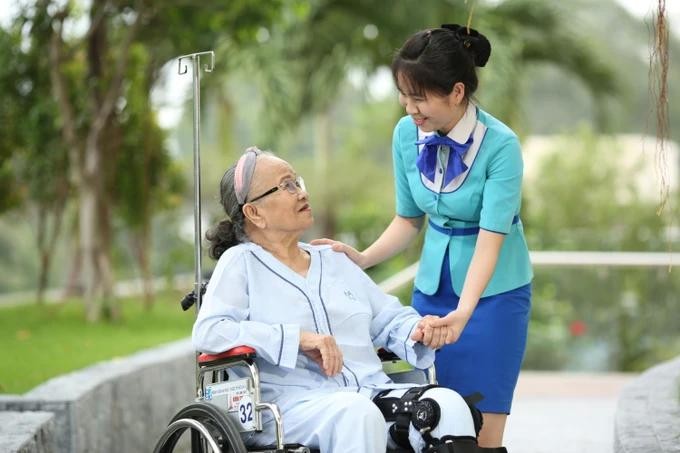
Over the past decades, the average lifespan of Vietnamese citizens has steadily risen from 65.2 years in 1989 to an impressive 74.5 years in 2023. However, the country's healthcare infrastructure has failed to adequately address the rapid aging of the population. It is now crucial to swiftly address the gaps in medical services and support for the elderly, ensuring they can enjoy their golden years in good health and happiness.
According to the World Health Organization (WHO), Vietnam is one of the ten countries with the fastest-aging populations in the world. Vietnamese males have the fifth highest life expectancy in Southeast Asia, while women have the second highest. Although life expectancy is rising, the elderly have a bad quality of life; the average number of healthy years is only 64, and the number of senior persons suffering from chronic diseases is increasing.
On average, an elderly person currently has to live with 3-5 diseases, of which the elderly often suffer from common diseases: diabetes, high blood pressure, osteoarthritis, Parkinson's, dementia, cancer.
In addition, more than 27 percent of the elderly need basic assistance with personal hygiene, dressing, walking, eating while 90 percent need support in using mobile phones and means of transportation.
Statistics from the Ministry of Health show that the cost of health care for an elderly person is 10 times higher than that of a child. However, building an elderly-friendly environment and implementing long-term health care in the community have received little attention.
The geriatric health system is not yet complete and has not met the needs of treating chronic diseases - diseases typical of the elderly. Many localities have not yet allocated funds to provide health care for the elderly, such as regular health check-ups, health management of the elderly from grassroots health care.
Furthermore, due to a shortage of geriatrics-trained doctors and nurses, there are few activities in the community to consult and share knowledge about illness prevention and treatment for the aged.
Head of the Department of Population and Family Planning (Ho Chi Minh City Department of Health) Pham Chanh Trung said that since 2017, the number of elderly people in the city has tended to increase rapidly. By the end of 2023, the number of people over 60 years old in Ho Chi Minh City was 1,338,680 people; the average life expectancy of the population in Ho Chi Minh City in 2023 was 76.3 years old, of which men were 73.9 years old and women were 79.2 years old.
He added that Ho Chi Minh City is experiencing rapid population aging due to declining birth rates and rising life expectancies. However, the training of geriatricians, or doctors specializing in elderly care, has not kept pace with the growth of aging population.
As a result, the care of the elderly primarily falls on family members, as the number of nurses and doctors with geriatric expertise remains limited and lacking in-depth knowledge of caring for the aging population. This has led to significant challenges in adequately supporting the city's growing elderly demographic.
According to Associate Professor Tang Chi Thuong, Director of the Ho Chi Minh City Department of Health, since mid-August 2023, the city's health sector has implemented free health check-ups for the elderly in the area to detect early, control chronic diseases well and save treatment costs.
Following over a year of implementation, the health sector of the city has assessed and screened in excess of 233,051 elderly residents, representing 19.5 percent of this demographic. By the conclusion of 2024, it is anticipated that approximately 280,000 elderly individuals, or 23.4 percent, will have undergone examination.
The studies indicate that a significant proportion of the elderly population is affected by bone and joint disorders, hypertension, ocular conditions, and cognitive decline.
Most elderly people neglect regular medical check-ups, often subjectively treating illnesses. As a result, diseases are frequently detected at advanced stages, making treatment much more challenging.
Ho Chi Minh City presently is home of approximately 20 social assistance centers which are responsible for taking care of the elderly. Of 20 centers, eight are privately operated and require payment for services.
Additionally, several hospitals in district along with those in Thu Duc City have initiated the treatment of geriatric conditions by establishing a Geriatric Department in conjunction with an Internal Medicine Department.
However, in reality, the needs of the elderly have not yet been met. As the first private unit to participate in the elderly care model, Director Mai Thi Huong of Tam An Nursing Home in Thu Duc City said that nursing homes are not medical facilities but contribute greatly to monitoring and early detection of medical risks for the elderly; at the same time, helping them maintain a better lifestyle.
According to Director Mai Thi Huong, the elderly in Tam An Nursing Home are all examined, monitored, reminded to take medicine every day by specialists and taken to the hospital for regular health check-ups or supported in handling some other medical problems as prescribed. In addition, the spiritual life of the elderly is always taken care of, helping the elderly live happily, healthily, usefully and thereby prolonging their life span.
A survey conducted by the Ministry of Labor, Invalids and Social Affairs regarding the quality of life for elderly individuals in nursing homes revealed that over 80 percent of participants expressed satisfaction with the healthcare services provided. The majority of respondents attributed their contentment to the care and support they received from staff, nurses, and fellow residents. This finding underscores the necessity of expanding care services and accommodating more elderly individuals in nursing homes. It is essential for the government to implement policies that support and promote these services in a diverse, professional manner while ensuring affordability.
























